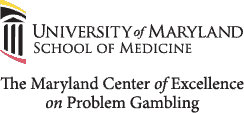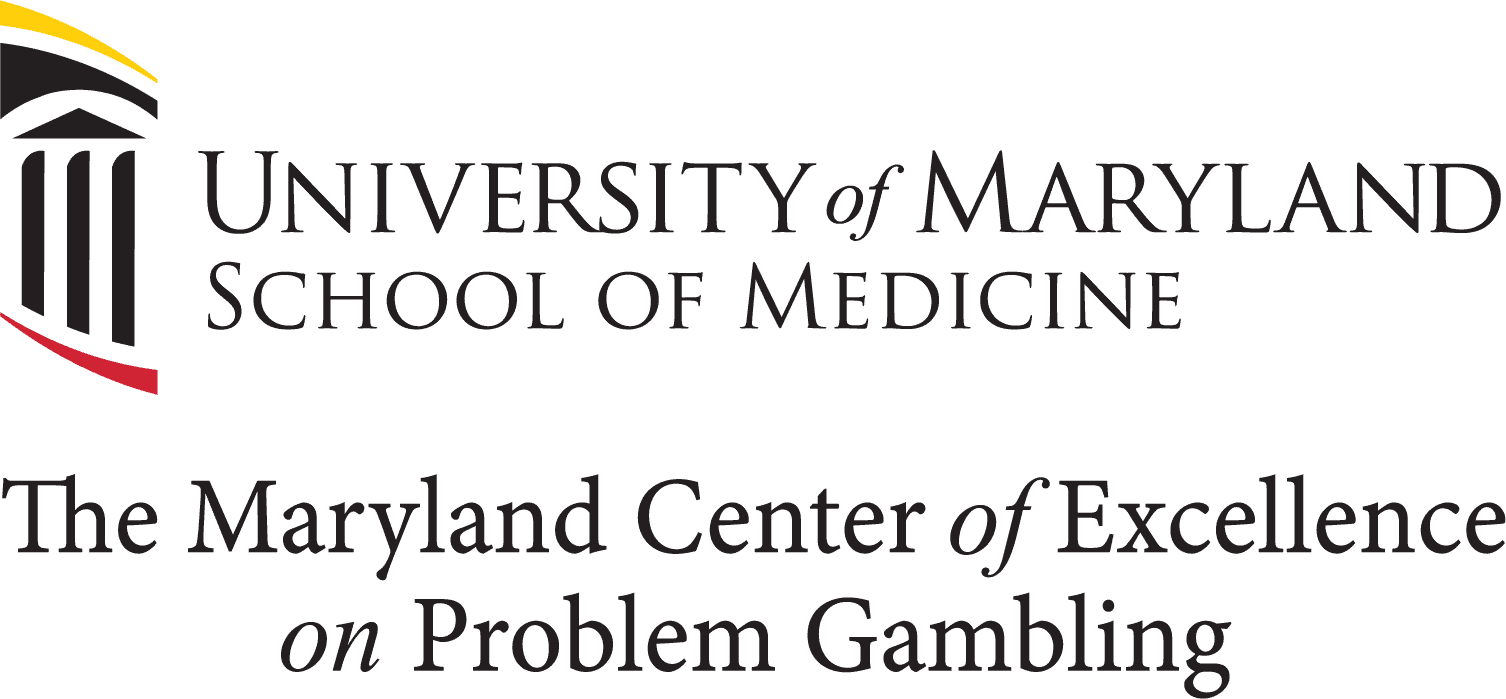Problem Gambling Webinar Series FY21
We invite you to join the Maryland Center of Excellence on Problem Gambling (the Center) for the 2020-2021 series of free webinars designed to provide additional problem gambling prevention, clinical and recovery training on a variety of topics. Webinars are one (1) hour in length, 12:00-1:00 PM EDT and award one (1) CEU (unless otherwise specified).
Additional Webinars will be posted throughout the year.
Friday, June 10, 2022
Don’t Forget About the Power of the Unconscious: A Psychodynamic Approach to Working with Problem Gamblers
Presented By:
Anthony S. Parente, MA, LCPC, ICGC II
Summary:
Summary: This interesting and informative webinar will discuss the unconscious processes that effect the development of the problem gambler. We will explore the various levels of consciousness, as it relates to the problem gambler. The discussion will also address the role of defense mechanisms, fantasy life and transference in the understanding of gambling disordered individuals. The application of psychodynamic principals in the treatment of the gambler will also be included in the presentation.
Summary: This interesting and informative webinar will discuss the unconscious processes that effect the development of the problem gambler. We will explore the various levels of consciousness, as it relates to the problem gambler. The discussion will also address the role of defense mechanisms, fantasy life and transference in the understanding of gambling disordered individuals. The application of psychodynamic principals in the treatment of the gambler will also be included in the presentation.
Learning Objectives:
Attendees should be able to:
- Participants will develop a greater understanding psychodynamic theory and how it explains the development of gambling disorder.
- Participants will learn how the concepts of defense mechanisms; fantasy life and transference apply to problem gambling.
- Develop a deeper understanding of how to apply the principals of psychodynamic psychology to the treatment of gambling disorder.
Continuing Education Units (CEUs) are provided for attendance on live webinar presentations; no CEUs are awarded for recording views.
Friday, May 27, 2022
The Importance of Language in our Work with problem Gamblers
Presented By:
Dr. Lori Rugle, PhD, ICGC II, BACC, ICGD
Summary:
A couple of years I ago, I was sitting next to a dear friend and person in recovery from a gambling disorder. I leaned over and whispered to her how distressing I found it for the presenter to refer to a person in recovery as “the gambler.” She said, “I know, if they say that one more time, I may scream.” This use of language is the norm, not the exception. It is so ubiquitous we don’t even think about it. Much more has been written about the significance of the language of recovery in the Substance Use Disorder and Mental Health fields; particularly around issues of stigma and shame. This presentation will address the importance of how to use words and language to reduce stigma in the field of gambling disorder for both individuals in recovery and their partners in recovery.
A couple of years I ago, I was sitting next to a dear friend and person in recovery from a gambling disorder. I leaned over and whispered to her how distressing I found it for the presenter to refer to a person in recovery as “the gambler.” She said, “I know, if they say that one more time, I may scream.” This use of language is the norm, not the exception. It is so ubiquitous we don’t even think about it. Much more has been written about the significance of the language of recovery in the Substance Use Disorder and Mental Health fields; particularly around issues of stigma and shame. This presentation will address the importance of how to use words and language to reduce stigma in the field of gambling disorder for both individuals in recovery and their partners in recovery.
Learning Objectives:
Attendees should be able to:
- Participants will be able to identify evidence for how gambling disorder is stigmatized.
- Participants will be able to define person first language and how even “neutral” terms may contribute to stigma around gambling disorder
- Participants will be able to identify effective strategies for reducing the stigma associated with harmful gambling
Continuing Education Units (CEUs) are provided for attendance on live webinar presentations; no CEUs are awarded for recording views.
Friday, May 20, 2022
Guess Who’s Coming to Problem Gambling Treatment, Prevention, and Community Wellness? What’s On Your Menu?
Presented By:
Dr. Deborah G. Haskins, LCPC, ACS, MAC, ICGC-II, CCGSO, BACC, CGT
Summary:
Remember Sidney Portier in the amazing “Guess Who’s Coming to Dinner?” Well, over 50 years later while there is diversity progress, we still appear surprised when treatment is available, but the numbers are quite low. Is it possible that mental health “menus” still rely on traditional theoretical and service delivery models lacking goodness-of-fit among culturally diverse individuals, families and communities? Less than 5% seek disordered gambling treatment (ncpgambling.com), and our treatment models and prevention efforts often lack cultural modifications to support communities we purport to support. Why aren’t we developing community wellness opportunities to meet the 95% who are not treatment seeking? Restaurants alter their menus regularly to meet customer needs. When will we make the necessary diversity, equity and inclusion strategic changes to appeal to the interests and desires of communities we serve? Are we willing to do a major overhaul? This session will challenge us to dig deeper and develop transformative DEI strategic plans to expand advocacy, treatment and prevention to meet the changing needs of communities during a pandemic and post-pandemic world.
Remember Sidney Portier in the amazing “Guess Who’s Coming to Dinner?” Well, over 50 years later while there is diversity progress, we still appear surprised when treatment is available, but the numbers are quite low. Is it possible that mental health “menus” still rely on traditional theoretical and service delivery models lacking goodness-of-fit among culturally diverse individuals, families and communities? Less than 5% seek disordered gambling treatment (ncpgambling.com), and our treatment models and prevention efforts often lack cultural modifications to support communities we purport to support. Why aren’t we developing community wellness opportunities to meet the 95% who are not treatment seeking? Restaurants alter their menus regularly to meet customer needs. When will we make the necessary diversity, equity and inclusion strategic changes to appeal to the interests and desires of communities we serve? Are we willing to do a major overhaul? This session will challenge us to dig deeper and develop transformative DEI strategic plans to expand advocacy, treatment and prevention to meet the changing needs of communities during a pandemic and post-pandemic world.
Learning Objectives:
- Identify “old” menu barriers to culturally accessible gambling disorders treatment, prevention, and community wellness.
- Highlight the benefit of adopting a health equity and social justice lens to expand problem gambling awareness and advocacy among culturally diverse communities.
- Provide “new menu” tips for developing community wellness.
Continuing Education Units (CEUs) are provided for attendance on live webinar presentations; no CEUs are awarded for recording views.
Friday, May 13, 2022
Promoting Resilience in The Family: Working with the Families of those with a Gambling Disorder
Presented By:
Anthony S. Parente, MA, LCPC, ICGC II
Summary:
The family members of the problem gambler experience a great deal of emotional strain and stress. Families need support and assistance to restore balance and psychological equilibrium. Join us for this interesting and informative presentation on family dynamics and building family resilience. Learn how to help families heal, grow, and recover. This workshop will address the treatment issues that are common and unique when working with the families of the problem gambler.
The family members of the problem gambler experience a great deal of emotional strain and stress. Families need support and assistance to restore balance and psychological equilibrium. Join us for this interesting and informative presentation on family dynamics and building family resilience. Learn how to help families heal, grow, and recover. This workshop will address the treatment issues that are common and unique when working with the families of the problem gambler.
Learning Objectives:
Attendees should be able to:
- To learn the definition of resilience and how to promote it.
- To develop an increased understanding of how to build resilience in the family of the problem gambler.
- To increase understanding of relevant family issues involved in the treatment of problem gamblers
- To learn therapeutic techniques to promote the recovery of the problem gambler and their family.
Continuing Education Units (CEUs) are provided for attendance on live webinar presentations; no CEUs are awarded for recording views.
Webinar Archives
Friday, June 11, 2021
Motivational Interviewing with the Problem Gambler
Presented By:
Anthony S. Parente, MA, LCPC, NCC, MAC, ICGC II, BACC
Summary:
Motivational Interviewing is an effective evidenced based approach used in the treatment of addictions. It is a Person-Centered style of counseling that uses techniques which engage clients to move toward changing behaviors and their lives. Join us for this informative workshop on how to impact the change process with clients who have problems with gambling with co-occurring addictions. Understand the spirit and the stages of MI as well as the strategies relevant for each stage. Explore when and how to use Motivational Interviewing as one of the intervention tools that is applicable to a variety of settings. This workshop will provide the clinician an opportunity to reflect on their practice.
Motivational Interviewing is an effective evidenced based approach used in the treatment of addictions. It is a Person-Centered style of counseling that uses techniques which engage clients to move toward changing behaviors and their lives. Join us for this informative workshop on how to impact the change process with clients who have problems with gambling with co-occurring addictions. Understand the spirit and the stages of MI as well as the strategies relevant for each stage. Explore when and how to use Motivational Interviewing as one of the intervention tools that is applicable to a variety of settings. This workshop will provide the clinician an opportunity to reflect on their practice.
Learning Objectives:
Attendees should be able to:
- Learn what Motivational Interviewing is and how it works to effect change.
- Learn how to apply the skills of MI.
- Gain an enriched understanding of the change process and our resistance to change.
- Learn and how to move clients through the stages of change.
Continuing Education Units (CEUs) are provided for attendance on live webinar presentations; no CEUs are awarded for recording views.
Friday, May 28, 2021
Don’t Forget About the Power of the Unconscious: A Psychodynamic Approach to Working with Problem Gamblers.
Presented By:
Anthony S. Parente, MA, LCPC, NCC, MAC, ICGC II, BACC
Summary:
This interesting and informative webinar will discuss the unconscious processes that effect the development of the problem gambler. We will explore the various levels of consciousness, as it relates to the problem gambler. The discussion will also address the role of defense mechanisms, fantasy life and transference in the understanding of gambling disordered individuals. The application of psychodynamic principals in the treatment of the gambler will also be included in the presentation.
This interesting and informative webinar will discuss the unconscious processes that effect the development of the problem gambler. We will explore the various levels of consciousness, as it relates to the problem gambler. The discussion will also address the role of defense mechanisms, fantasy life and transference in the understanding of gambling disordered individuals. The application of psychodynamic principals in the treatment of the gambler will also be included in the presentation.
Learning Objectives:
Attendees should be able to:
- Develop a greater understanding psychodynamic theory and how it explains the development of gambling disorder.
- Learn the concepts of defense mechanisms, fantasy life and transference apply to problem gambling.
- Develop a deeper understanding of how to apply the principals of psychodynamic psychology to the treatment of gambling disorder.
Continuing Education Units (CEUs) are provided for attendance on live webinar presentations; no CEUs are awarded for recording views.
Friday, January 15, 2021
Peer Recovery Support for Problem Gambling
Presented By:
The Maryland Center of Excellence on Problem Gambling Certified Peer Recovery Support Specialists
Summary:
Peer Recovery Support provides individualized recovery for those seeking a healthier and happier life from addictive behavior. In FY2017, the Maryland Department of Health Behavioral Health Administration expanded the state’s Peer Support initiatives by granting the Center additional funding to develop a Peer Recovery Support program specifically for those struggling with problem gambling and disordered gambling. Sharing personal insights, the Center’s Peer team will provide an overview of peer support for problem gambling/disordered gambling and share their experiences (successes and challenges).
Peer Recovery Support provides individualized recovery for those seeking a healthier and happier life from addictive behavior. In FY2017, the Maryland Department of Health Behavioral Health Administration expanded the state’s Peer Support initiatives by granting the Center additional funding to develop a Peer Recovery Support program specifically for those struggling with problem gambling and disordered gambling. Sharing personal insights, the Center’s Peer team will provide an overview of peer support for problem gambling/disordered gambling and share their experiences (successes and challenges).
Learning Objectives:
Attendees should be able to:
- Understand the history and effectiveness of Peer Recovery Support in general and within Maryland.
- Learn how Peer Recovery Support for problem gambling/disordered gambling differs from other addiction support.
- Learn about the resources available for problem gambling Peer Support and how to engage the Center’s Peer team.
Continuing Education Units (CEUs) are provided for attendance on live webinar presentations; no CEUs are awarded for recording views.




